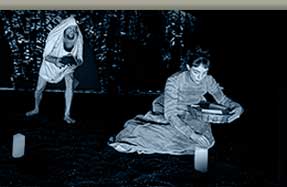





1.6 · FOUR VISIONS OF THEATRE: ANGÉLICA LIDDELL AND HER GENERATION
Por Ewelina Topolska
4. Celebrating the woman: Itziar Pascual
If Cunillé’s theatre has been labelled as “cold” (Puchades, 2005), Pascual’s plays are imbued with human warmth and subtle hope, even when she talks about topics as difficult as domestic violence or Civil War. A journalist, a university professor, a theatre researcher and an active member and president of various theatre associations28, Pascual began her career as a playwright at the beginning of the 1990s, achieving her first mise-en-scène in 1994 with the play Confort (Rovecchio Antón, 2015, 62). The following year the author was awarded the Prize of the City of Alcorcón for The Shadow-Tamer (El domador de sombras) and that, along with a secondary Award Marqués de Bradomín for Voices of Penelope (Voces de Penelope, written 1996) turned her into a recognizable voice of the Spanish theatrical panorama [fig. 6]. Other of Pascual’s texts deserving special acknowledgement include: Blue Mountain (Honourable Mention of the María Teresa de León Award, 1998), Sirens of Tar (Sirenas de alquitrán, 2001), Peace of the Twilight (La paz del crepúsculo, Serantes Award 2002), Wall (Pared, Award Madrid Sur, 2004) [fig. 7], Variations on Rosa Parks (Variaciones sobre Rosa Parks, Award Valle-Inclán, 2007), Princesses, Forgotten or Unknown (Princesas olvidadas o desconocidas, with Cristina D. Silveira, Award Jara for the Best Theatre Show in Extremadura, 2009; a play for all audiences) and Moje holka, moje holka29(with Amaranta Osorio, VII Award Jesús Domínguez).
Some of these titles already give us a hint about Itziar Pascual’s primary concern - to make the woman visible, to make her story audible, to make her the main, rather than the secondary character of the play called life. A sworn feminist, Pascual condemns the ever-persisting inequalities between the two sexes, converting her artistic production into a tool against oppression (e.g. Wall30 is a cry against gender violence), objectification (women are no longer passive objects, but active agents in their stories, like in Voices of Penelope) and oblivion31.
Saving extraordinary women from social amnesia and celebrating their lives and achievements is an especially estimable undertaking of Pascual’s writing. An example of this endeavour is the previously mentioned play Variations on Rosa Parks, a homage tothe famous civil rights activist, called by the United States Congress “mother of the freedom movement” (United States Congress, 1999), or a short monologue Natalia Karp’s Soliloquy (Soliloquio de Natalia Karp, 2008), evoking the figure of the famous Polish-Jewish pianist, survivor of the Kraków-Płaszów and Auschwitz concentration camps.
Interestingly, Pascual does not limit her artistic activity to the adult audience, but, following the example of her admired Canadian author Suzanne Lebeau32, caters to younger spectators, all the while accentuating female roles and exhibiting female role models. One of such children’s theatre plays, Chewing Nettles (Mascando Ortigas, Award ASSITEJ of Theatre for Children and Youth, 2005), was inspired by the life and work of Pina Bausch. Another, Wangari, the Tree Girl (Wangari, la niña árbol, 2012) familiarises children with the 2004 Nobel Peace Prize Winner, Wangari Maathai, famous for her efforts aimed at the reforestation of Africa (Green Belt Movement).
The aspect of Lebeau’s theatre that Pascual finds especially appealing is hope. Hope understood not as pollyannism based on the denial of reality, but as resilience, as the capacity for action which is an expression of belief in a future, as self-reliance and motivation to survive in the face of adversity. Indelibly, this approach is clearly visible in Pascual’s texts. “No matter what happens, I’ll always fight for my life” – says a Historical Woman in Moje holka, Moje holka (Pascual and Osorio, 2016, 59), and the words are echoed by a whole chorus of characters conceived by this playwright33.
Pascual commented on this meaning of hope during a talk given in 2015 at the Higher School of Performing Art (ESAD) in Cáceres34, pointing to this quality as a necessary element of the present theatre (“teatro presente”). The author analyses the role of theatre in contemporary society from a genuine sense of responsibility, vindicating the stage as an incubator of expectations, solutions, alternatives that should help the society progress toward the future while avoiding major catastrophes. She also views it as a haven for such values as love, beauty and justice35, for a culture of care, whose key representatives are women. “When you sow, the culture of care grows, it becomes mutual and expands towards other pathways” (Cobo Montejo, 2016), affirms the dramaturge in an interview on her children’s play The Life of Salmons (La vida de los salmones, Award SGAE of Children’s Theatre 2015). And that is exactly what she is determined to do – sow.
28 Pascual has two Master’s degrees, in Journalism and Dramaturgy, as well as a PhD in Information Sciences. Her dissertation focused on the activity of the Spanish Association of Women of Performing Arts (AMAEM) Marías Guerreras (Fighting Marys), of which she was the president between 2000-2003. Since 1999 she has worked as a professor of Dramatic Literature and Dramaturgy at the Royal School of Performing Arts (RESAD) in Madrid.
29 From Czech: my girl, my girl.
30 Emmanuelle Garnier analyses this play in detail in her book Lo trágico en femenino. Dramaturgas españolas contemporáneas (2011, 45-55).
31 In line with her struggle against oblivion, Pascual opens the play Père Lachaise (2003), a piece dedicated to the victims of the Spanish Civil War, with a quote from Hélène Cixous’s The Laugh of the Medusa “[W]riting […] is undoing the work of death” (1976, 883).
32 Pascual even authored a book on Lebeau’s artistic production: Suzanne Lebeau: Las huellas de la esperanza (Suzanne Lebeau: traces of hope, 2007).
33 Variations on Rosa Parks opens with a dedication “To the women who do not give in” (Pascual, 2008).
34 Available on the youtube channel of ESAD Extremadura: https://www.youtube.com/channel/UCiMpo1rWcPzynQiUd-5c4Tg
35 She commented on the need to promote these values in theatre during her lecture in January 2018 in Valencia: https://www.youtube.com/watch?v=97QXOInY4gY
![]()
Don Galán. Revista audiovisual de investigación teatral. | cdt@inaem.mecd.es | ISSN: 2174-713X | NIPO: 035160842
2018 Centro de Documentación Teatral. INAEM. Ministerio de Educación, Cultura y Deporte. Gobierno de España. | Diseño Web: Toma10
Inicio | Consejo de Redacción | Comité Científico | Normas de Publicación | Contacto | Enlaces